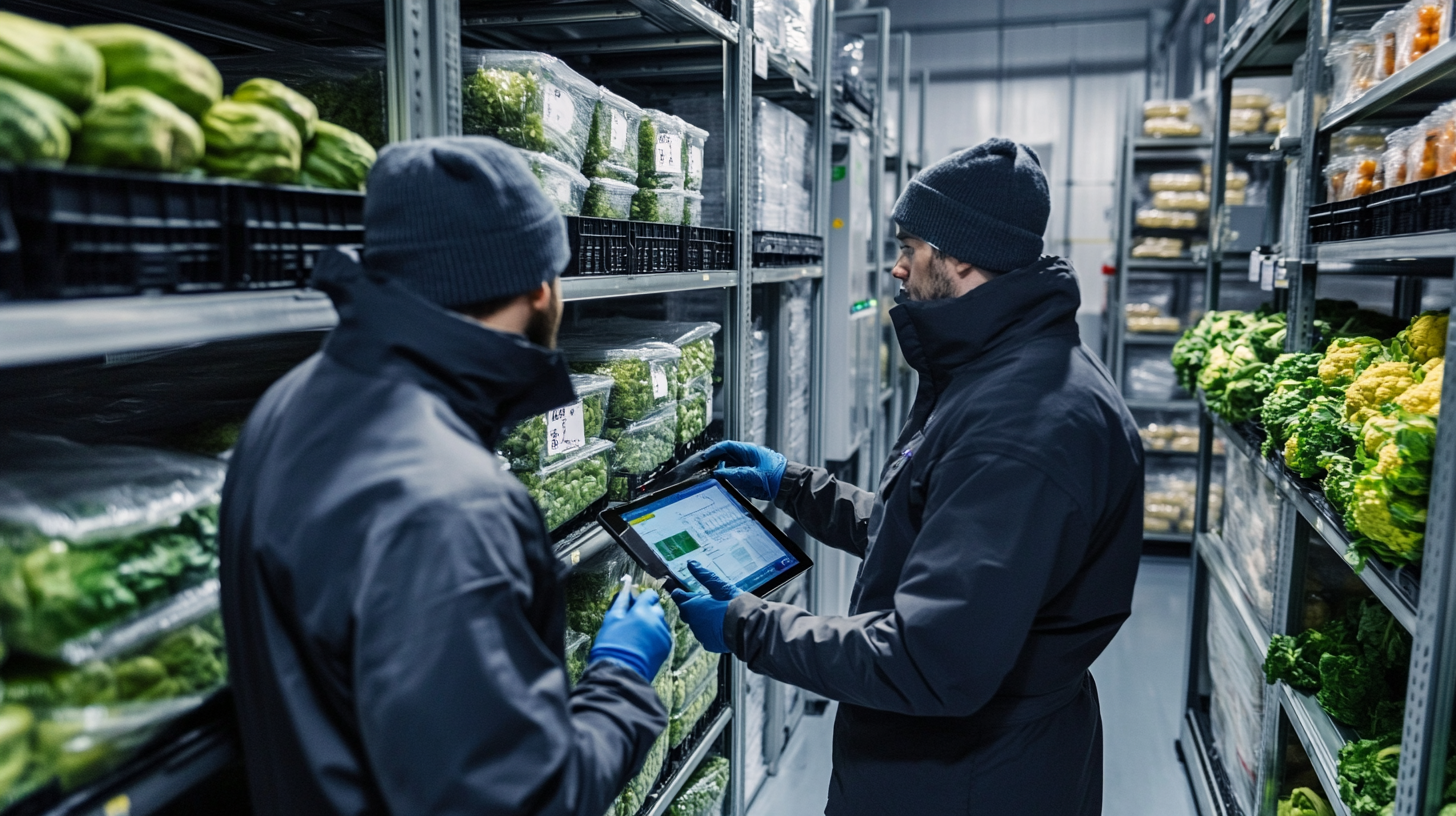
Fresh and refrigerated logistics in Spain: Current position, challenges and opportunities in a European comparison – Image: Xpert.Digital
🐟❄️ Fresh produce logistics and refrigerated logistics in Spain: Where does the country stand compared to Europe?
📦🌍 Current status and development
Cold chain logistics in Spain is a significant and dynamically growing sector, driven by the increasing demand for temperature-sensitive products such as fresh food, pharmaceuticals, and other sensitive goods. In recent years, the expansion of e-commerce and the growing importance of global supply chains have significantly reinforced the role of cold chain logistics. Forecasts predict that the cold chain logistics market in Europe will reach a volume of US$68.55 billion by 2024 and grow to an impressive US$104.23 billion by 2029, representing a compound annual growth rate (CAGR) of 8.97%. Spain is a key player in this European growth, although the country faces some specific challenges.
While Spain may not be a leading player in the European cold chain logistics market compared to countries like Germany or the Netherlands, it plays a significant role nonetheless. The country's strategic location, well-developed infrastructure, and position as one of Europe's largest exporters of agricultural products give Spain a central role in fresh and cold chain logistics.
🏗️🚛 Spain's strengths in cold chain logistics
1. Strategic location and importance as an export nation
Spain plays a key role in European fresh produce logistics, particularly due to its geographical location as a bridge between Europe, Africa, and Latin America. The ports of Algeciras, Valencia, and Barcelona are important hubs for international trade. Spain is one of the largest exporters of agricultural products in Europe, including citrus fruits, olive oil, wine, and other perishable goods. These products require high-performance cold chain solutions to ensure quality on their way to markets in Northern Europe and worldwide.
2. Well-developed infrastructure
With one of the longest motorway networks in Europe, spanning over 13,500 kilometers, and modern logistics centers, Spain is ideally positioned for road freight transport. Madrid's central geographic location enhances its role as a logistics hub. Furthermore, rail transport is increasingly being used for refrigerated goods, improving efficiency and sustainability.
3. Technological advances
Spanish companies are increasingly investing in advanced technologies to improve the efficiency of their cold chains. These innovations include telematics systems that enable real-time monitoring of temperature, humidity, and other critical parameters. Globally operating companies like Lineage Logistics and Schmitz Cargobull are driving these developments, thereby strengthening Spain's competitiveness in this sector.
📊🔬 Comparison with other European countries
1. Germany: A benchmark for efficiency
Germany is considered the European market leader in cold chain logistics, characterized by advanced technologies, stringent quality standards, and a strong food and pharmaceutical industry. The automation of warehouses and the use of robotics in logistics set benchmarks. German companies are pioneers in the development of sustainable and energy-efficient cold chain logistics concepts.
2. Netherlands: Europe's logistics hub
The Netherlands benefits from its central location in Europe and its highly developed logistics infrastructure. The Port of Rotterdam, one of the world's largest ports, is a major transshipment hub for refrigerated goods. Through specialized cold chain solutions and a strong export focus, the Netherlands is a leader in temperature-controlled transport.
3. Market size in comparison
While the German market for refrigerated logistics is estimated at US$16.92 billion in 2024, the Spanish logistics market as a whole has a larger volume (US$73.94 billion for the entire freight and logistics sector). However, Spain is less advanced in the area of specialized refrigerated logistics and has some catching up to do in terms of technology and market structure.
⚠️💸 Challenges of cold chain logistics in Spain
1. High costs and fragmentation
In key logistics regions like Madrid and Barcelona, land prices and rental costs are rising continuously, making it difficult to establish new facilities. Furthermore, the Spanish market is highly fragmented due to the large number of small and medium-sized enterprises (SMEs) operating in the sector. This market structure often leads to inefficiencies and makes it difficult to implement uniform standards.
2. Technological gaps
Although Spain has made progress in implementing modern technologies in recent years, it still lags behind leading countries like Germany. Gaps exist particularly in the areas of automated warehousing, blockchain technology, and the integration of IoT sensors into cold chains.
Suitable for:
3. Infrastructure and environmental risks
Extreme weather events such as DANA storms (Depresión Aislada en Niveles Altos) or heat waves can significantly disrupt supply chains. This leads not only to delays but also to higher operating costs. At the same time, there is a need for further investment in modernizing refrigeration technologies and logistics management systems to meet increasing market demands.
4. Regulatory requirements
Strict regulations regarding food safety and quality control pose challenges for companies. To comply with these standards, continuous investment in training, technology, and certifications is required.
💡🚀 Future prospects and opportunities
Despite the aforementioned challenges, cold chain logistics in Spain offers enormous growth opportunities. Innovation and technological developments are key drivers in this growth.
1. Technology and Digitalization
The use of blockchain technologies and IoT sensors will further improve the traceability and efficiency of cold chains. These innovations make it possible to monitor data in real time and ensure transparency at all stages of the supply chain.
2. Sustainability
The increasing pressure on companies to implement environmentally friendly solutions is driving the development of low-emission refrigeration systems and the use of alternative energies such as solar power. Sustainability is becoming a crucial competitive advantage in cold chain logistics.
3. E-commerce and consumer behavior
The boom in online retail is driving demand for fast and efficient cold chain logistics solutions. Food delivery services and the shipment of pharmaceuticals are becoming increasingly important, necessitating the expansion of cold chains.
4. International Cooperation
Spain can benefit from international partnerships to catch up technologically and adopt best practices from other countries. Collaboration with global logistics companies could strengthen the sector sustainably.
✅📈 Need to catch up in the areas of technology, market organization and sustainability
The cold chain logistics sector in Spain is at a turning point. The country possesses significant strengths such as its strategic location, robust infrastructure, and a robust agricultural sector. Nevertheless, there is room for improvement in technology, market organization, and sustainability. Investments in innovative systems and addressing challenges such as rising costs and regulatory requirements will be crucial to strengthening Spain's position within Europe.
With a clear focus on digitalization, sustainability and adaptation to global trends, Spain has the potential to expand its role as a key player in European cold chain logistics while simultaneously opening up new business opportunities.
📣 Similar topics
- 📦 Logistics in transition: Spain's role in cold chain logistics
- 🚛 Freshness on Wheels: Progress and Challenges in Spain's Cold Storage Logistics
- 🌍 Europe's cold chain: How Spain compares
- 🥶 Cold chain logistics in Spain: Opportunities in a hot market
- ⚡ Technology meets efficiency: Innovations in the Spanish cold chain
- 🌱 Sustainability in the cold chain: Spain's contribution to green logistics
- 🏗️ Infrastructure & Export: Spain's strengths in fresh food logistics
- 💻 Digitalization in focus: Spain's future in cold chain logistics
- 💡 Overcoming challenges: Solutions for Spain's cold chain sector
- 🚢 International connections: Spain's ports as hubs for cold chain logistics
#️⃣ Hashtags: #ColdLogistics #Sustainability #FreshLogistics #Digitalization #Technology
Xpert partner in warehouse planning and construction
Xpert.Plus warehouse optimization - high-bay warehouses such as pallet warehouses consulting and planning
We are there for you - advice - planning - implementation - project management
☑️ SME support in strategy, consulting, planning and implementation
☑️ Creation or realignment of the digital strategy and digitalization
☑️ Expansion and optimization of international sales processes
☑️ Global & Digital B2B trading platforms
☑️ Pioneer Business Development
I would be happy to serve as your personal advisor.
You can contact me by filling out the contact form below or simply call me on +49 89 89 674 804 (Munich) .
I'm looking forward to our joint project.
Xpert.Digital - Konrad Wolfenstein
Xpert.Digital is a hub for industry with a focus on digitalization, mechanical engineering, logistics/intralogistics and photovoltaics.
With our 360° business development solution, we support well-known companies from new business to after sales.
Market intelligence, smarketing, marketing automation, content development, PR, mail campaigns, personalized social media and lead nurturing are part of our digital tools.
You can find out more at: www.xpert.digital - www.xpert.solar - www.xpert.plus

